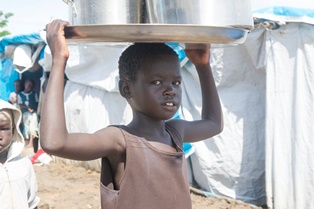
South Sudan has agreed to end fighting and pledged to set up a transitional government within 60 days and to resolve the conflict that’s caused a massive humanitarian crisis -resulting in thousands being killed and more than 1 million people fleeing their homes since December.
In a rare meeting between the South Sudanese political rivals, President Salva Kiir and rebel chief Riek Machar agreed to end the fighting and set up a new government. The talk was held in Ethiopia’s capital and mediated by East Africa’s regional bloc Intergovernmental Authority on Development.
“They agreed to complete the dialogue process within the coming 60 days on what, how, when and who… to the formation of a transitional government of national unity,” Ethiopian Prime Minister Hailemariam Desalegn told media on Tuesday, June 10.
The Intergovernmental Authority on Development has threatened sanctions if Kiir and Machar fail to abide by the agreement since previous deals to end the violence have been broken by both sides, most recently in May, causing the country to descend further into crisis.
This is the first time South Sudan’s neighbours have issued such a warning, reflecting the region’s frustration.
“There has been a growing tendency to continue with the war,” Desalegn said while criticising both sides for breaking the May 9 ceasefire.
The United States has already imposed sanctions on both sides of the conflict. On June 12 it condemned attacks by the Sudanese government on civilians in the Blue Nile and South Kordofan states saying they have been deliberately targeting hospitals and schools.
The United Nations has warned of a famine that could effect around as many as 4 million people if the situation doesn’t improve.
Effects on Christians
Although the conflict is largely viewed in ethic terms, church leaders have called for peace and reconciliation, and stressed that the roots of the crisis are political.
One of the most devastating events since the conflict began happened in January, when scores of female church workers were massacred as they sought refuge at a church in the central South Sudanese town of Bor. The women, several of whom were elderly, were raped before being killed with gun shots.
South Sudan has been in turmoil since Dec. 15, when a dispute within the army sparked fierce fighting in the capital city, Juba. Fighting spread quickly across the country and soon took on an ethnic dimension after President Salva Kiir alleged that his former vice-president, Riek Machar, was planning a coup. The fighting has pitted army forces loyal to President Kiir, who is a member of the Dinka tribe, against rebel forces aligned to Machar, a member of the Nuer tribe.
The Dinka tribe is the largest in South Sudan; the Nuer is the second largest and boasts a deadly tribal militia known as the “White Army” because its fighters rub white ash, extracted from burnt cow dung, over their bodies. The White Army’s main role in the community historically has been to raid cattle and protect the community, but recently it has transformed into a militia used for political gain.
The White Army is suspected to have carried out the massacre of the women and more than 2,500 others in Bor, a largely Dinka town.
